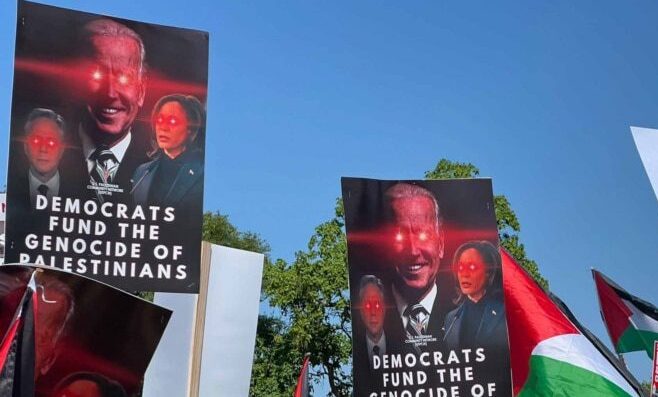BTN News: Thousands of impassioned protesters converged at Union Park in Chicago, only steps away from the bustling hub of the Democratic National Convention, to raise their voices in support of immigrants, reproductive rights, and the pro-Palestinian movement. As the Democratic Party began its high-profile event, these demonstrators sought to ensure that critical issues—often sidelined in political discourse—were brought to the forefront of the national conversation. Their presence was a powerful reminder that the fight for justice, equality, and human rights remains an ongoing battle, deeply intertwined with the political narratives that shape the future of the country.
The energy in Union Park was palpable as people from diverse backgrounds united under a common cause. Signs emblazoned with messages advocating for the rights of immigrants, the preservation of reproductive freedoms, and solidarity with Palestine filled the air, transforming the park into a vibrant tableau of resistance and hope. The rally served not just as a protest, but as a poignant statement of the urgency of these issues—demanding attention from the very leaders gathered nearby to chart the Democratic Party’s future.
The timing of the protest was no coincidence. On the first day of the Democratic National Convention, these activists sought to influence the party’s platform, urging delegates and attendees to prioritize policies that support marginalized communities and uphold human rights. The intersectionality of the causes represented—immigrant rights, reproductive justice, and Palestinian solidarity—highlighted the interconnected nature of social justice movements. Each issue, though distinct, shared a common thread: the struggle against oppression and the demand for equity.
The demonstrators’ message was clear: the policies and platforms debated at the convention must reflect the voices of those who are often unheard or ignored. They called on the Democratic Party to take bold stances on immigration, ensuring pathways to citizenship for undocumented individuals and protecting the rights of asylum seekers. Reproductive rights activists emphasized the need for unwavering support for access to abortion and contraception, particularly in the face of increasing legislative attacks. Meanwhile, advocates for Palestine urged the party to adopt a more just and humane approach to U.S. foreign policy in the Middle East, particularly in relation to the Israeli-Palestinian conflict.
As the sun set on the first day of the convention, the echoes of the chants from Union Park resonated across Chicago, serving as a stark reminder that the fight for justice is far from over. The protesters’ voices—demanding dignity, equity, and respect for all—stood as a powerful testament to the enduring spirit of activism in America. The convention may have been the headline event, but the real story was being written in the streets, where ordinary citizens came together to demand extraordinary change.
In conclusion, this demonstration at Union Park was more than just a protest; it was a call to action for the Democratic Party and the nation as a whole. As the political landscape continues to evolve, the issues of immigration, reproductive rights, and Palestinian solidarity will undoubtedly remain central to the broader struggle for social justice. The protesters at Union Park have ensured that these critical topics are not only part of the conversation but are driving it forward. Their actions underscore the importance of grassroots movements in shaping political agendas and remind us that the true power in democracy lies in the hands of the people.


